在工程中包含两个cpp文件(只有一个有main),那这段程序是怎样运行的?
Posted
tags:
篇首语:本文由小常识网(cha138.com)小编为大家整理,主要介绍了在工程中包含两个cpp文件(只有一个有main),那这段程序是怎样运行的?相关的知识,希望对你有一定的参考价值。
还有,为什么规定工程中能有两个cpp,如果是相互引用的话用**.h 不就行了吗,两个cpp就几个有什么意义,,,
1、首先写一个简单的cpp程序,这里用的vim。
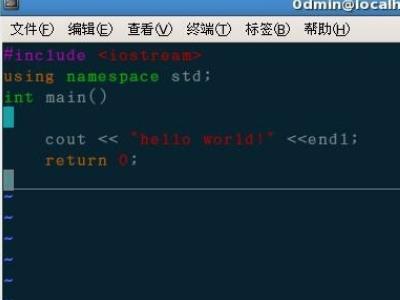
2、写好之后,保存退出;vim输入[:wq],回车,保存退出。

3、然后,使用命令[ls],可以看到自己刚才写的cpp文件。
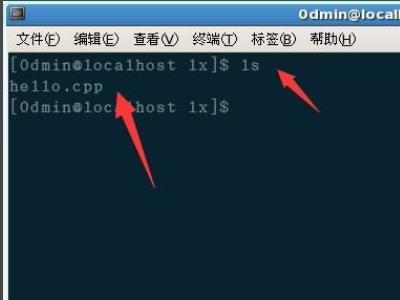
4、如果之前在Linux下写过C程序,可以知道编译C程序用的命令是[gcc hello.c -o hello]。
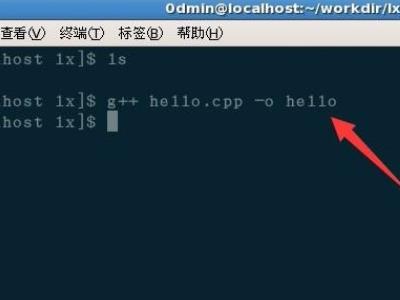
5、然后再用[ls]命令,查看编译出来的可执行文件。
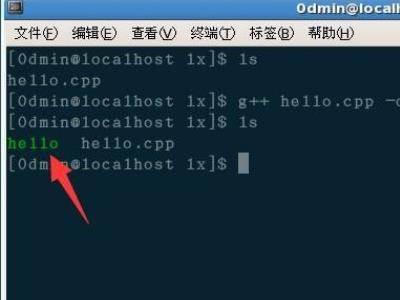
6、最后使用命令[./hello],运行程序就完成了。
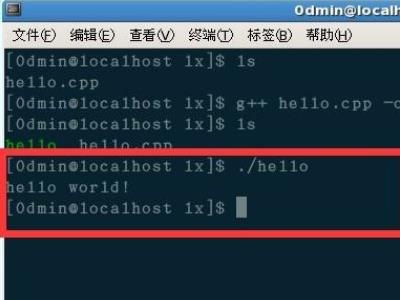
那写了其它的cpp,引用其中的函数时还加不加声明#include
本回答被提问者和网友采纳 参考技术B 我猜你现在学的是C++,首先必须有一个主函数main,cpp指的是文件扩展名,另外文件有.h和.cpp是类的定义和实现,在cpp文件必须加上.h头文件,而不是.cpp. 参考技术C 你创建新文件时没有把文件包含到编译目录中。项目属性中设置一下,把它包含进去就行了。如何在除 main.cpp 之外的其他文件中包含 OTL 标头?
【中文标题】如何在除 main.cpp 之外的其他文件中包含 OTL 标头?【英文标题】:How to include the OTL header in other files besides main.cpp? 【发布时间】:2016-09-03 03:39:57 【问题描述】:我在我的项目中使用 OTL。 以下代码按预期工作:
#include <iostream>
using namespace std;
#include <stdio.h>
#define OTL_ODBC // CompileOTL 4.0/ODBC
// Thefollowing #define is required with MyODBC 5.1 and higher
#define OTL_ODBC_SELECT_STM_EXECUTE_BEFORE_DESCRIBE
#define OTL_UNICODE // CompileOTL with Unicode
#include "../OTLtest/otlv4.h"// include the OTL 4.0 header file
otl_connect db; // connect object
void insert()
// insert rowsinto table
otl_stream o(1, //buffer size should be == 1 always on INSERT.
"insert into test_tab values(:f1<int>,:f2<char[5]>)",
// SQLstatement, char[5] means 5 2-byte
// Unicodecharatcters including a null
// terminator
db // connectobject
);
unsigned short tmp[32]; // Nullterminated Unicode character array.
for(int i = 1; i <= 100; ++i)
o << i;
tmp[0] = 1111; //Unicode character (decimal code of 1111)
tmp[1] = 2222; //Unicode character (decimal code of 2222)
tmp[2] = 3333; //Unicode chracater (decimal code of 3333)
tmp[3] = 4444; //Unicode chracater (decimal code of 4444)
tmp[4] = 0; //Unicode null terminator
o << (unsigned char*)tmp;
// overloadedoperator<<(const unsigned char*) in the case of Unicode
// OTL acceptsa pointer to a Unicode character array.
//operator<<(const unsigned short*) wasn't overloaded
// in order toavoid ambiguity in C++ type casting.
void select()
otl_stream i(50, //buffer size
" select* from test_tab "
"where f1>= :f11<int> "
" and f1 <= :f12<int>*2 ",
// SELECTstatement
db // connectobject
);
// create selectstream
int f1;
unsigned short f2[32];
i << 8 << 8; // assigning :f11 = 8, f12 = 8
// SELECTautomatically executes when all input variables are
// assigned. Firstportion of output rows is fetched to the buffer
while(!i.eof())
// while not end-of-data
i >> f1;
i >> (unsigned char*)f2;
// overloaded operator>>(unsignedchar*) in the case of Unicode
// OTL acceptsa pointer to a Unicode chracter array.
//operator>>(unsigned short*) wasn't overloaded
// in order toavoid ambiguity in C++ type casting.
cout << "f1=" << f1 << ", f2=";
for(int j = 0; f2[j] != 0; ++j)
cout << "" << f2[j];
cout << endl;
i << 4 << 4; // assigning :f11 = 4, :f12 = 4
// SELECTautomatically executes when all input variables are
// assigned. Firstportion of output rows is fetched to the buffer
while(!i.eof())
// while not end-of-data
i >> f1 >> (unsigned char*)f2;
cout << "f1=" << f1 << ", f2=";
for(int j = 0; f2[j] != 0; ++j)
cout << "" << f2[j];
cout << endl;
int main()
otl_connect::otl_initialize(); // initialize the database API environment
try
db.rlogon("root/123456@rhctp");
otl_cursor::direct_exec(
db,
"drop table test_tab",
otl_exception::disabled // disable OTL exceptions
); // droptable
otl_cursor::direct_exec(
db,
"create table test_tab(f1 int, f2 varchar(11))"
); // create table
insert(); //insert records into table
select(); //select records from table
catch(otl_exception&p)
// intercept OTL exceptions
cerr << p.msg << endl; // print out error message
cerr << p.stm_text << endl; // print out SQL that caused the error
cerr << p.var_info << endl; // print out the variable that caused the error
db.logoff(); //disconnect from the database
getchar();
return 0;
但是当我在我的项目中添加另一个类时,比如类 Test,其中包含 #include "../OTLtest/otlv4.h"。 Visual Studio 2015 不会生成项目。
//TestOTL.h
#pragma once
class TestOTL
public:
TestOTL();
~TestOTL();
;
//TestOTL.cpp
#include "TestOTL.h"
#include "../OTLtest/otlv4.h"// include the OTL 4.0 header file
TestOTL::TestOTL()
TestOTL::~TestOTL()
如果我从TestOTL.cpp 文件中删除#include "../OTLtest/otlv4.h",则项目运行良好。
问题
我应该在 main.cpp 之外的文件中包含 OTL 头吗? 如果我应该,那我该怎么做?
【问题讨论】:
【参考方案1】:看来下面的代码可以工作
#include "TestOTL.h"
#define OTL_ANSI_CPP_11_NULLPTR_SUPPORT
#define OTL_ODBC // CompileOTL 4.0/ODBC
#include "../OTLtest/otlv4.h"// include the OTL 4.0 header file
extern otl_connect db;
TestOTL::TestOTL()
otl_stream o(1, //buffer size should be == 1 always on INSERT.
"insert into test_tab values(:f1<int>,:f2<char[5]>)",
// SQLstatement, char[5] means 5 2-byte
// Unicodecharatcters including a null
// terminator
db // connectobject
);
TestOTL::~TestOTL()
【讨论】:
以上是关于在工程中包含两个cpp文件(只有一个有main),那这段程序是怎样运行的?的主要内容,如果未能解决你的问题,请参考以下文章